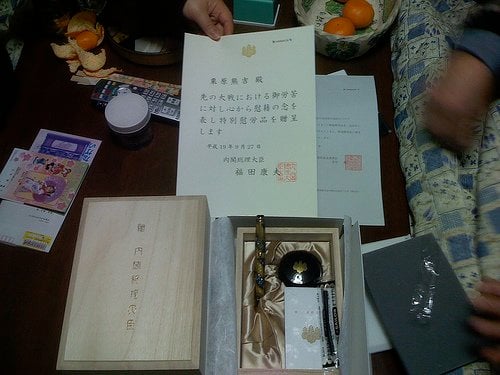I’ve got a bit of a problem. On January 1st we did what we always do, visiting my wife’s family, including making our annual trip to her 80-year-old uncle’s house. He fought during World War II on the Ise, essentially a battleship on the front and a flight deck on the back which could launch a squadron of fighters. We like to listen to his war stories — he talks about how he got the scar on his face from shrapnel from an American bomb, and how the only reason he survived the war is because they took the fuel from his ship and gave it to the Yamato for its final sortie. I like my kids to talk with him as much as possible, since it’s hard to get the kind of insight he can offer us about the past. Anyway, he’s decided he wants to learn how to use the Internet, and is hoping we can help him get online. Now, it can be a challenge for any older person to learn something that complex, but it’s doubly hard for him. When he was growing up, it was considered “unpatriotic” to use foreign loan words from English, which resulted in words like “curry” being translated into kanji meaning “yellow sauce with meat on rice” (黄色肉入り汁かけご飯)for the duration of the war, and as a result, people from his generation understandably know almost zero English. Yet here I am trying to explain alien terms like “mouse” “browser” and “window,” words that can’t be translated into Japanese since they’re exclusively used in English. It sure is a challenge.
One of the more useful words of Japanese you might want to learn is nani, which essentially means “what,” and is one of the first words that old-school anime fans from the 1980s like me learned — we didn’t have any of these newfangled “subtitles” or “English dubbed tracks” you kids have nowadays. While you can occasionally hear nani?! (what?!) when watching anime or dramas in Japanese, the word usually takes a more polite form in everyday use. The most common usage would be nan desu ka? (nahn dess kah), which is just “What [is it]?” with an implied subject that’s usually clear from the context. If you want to ask what a specific object is, point to it and say kore wa nan desu ka? (ko-REH wa nan dess ka), which is “What is this?” In Japanese, there are “counters,” words you use to count different types of items, like mai (for counting flat objects, like sheets of paper or coins) or hon (for counting cylindrical objects like umbrellas). You can combine these counters with nani to ask thing like “how many playing cards?” or “how many pencils?” which would be nanmai? or nanbon? respectively. Put this kanji together with the character for “hour” and you get nanji, what hour, e.g what time is it now. Since this word has the same pronunciation as that dreamy bread served in Indian restaurants (naan), all foreigners are required to make the same corny joke, holding up the bread and asking kore wa nan desu ka? (which would mean either “what is this?” or “is this naan bread?”).
One thing I’ve noticed about Japan: it’s a very seasonal place. Spring is beautiful with its short-lived cherry blossoms, summer is hot and humid with many festivals, fall is filled with crisp brown leaves, and winter is cold and frosty. I’ve met Japanese who tell me with great pride that, unlike America, Japan has four distinct seasons, and they enjoy every one of them — apparently these people haven’t ventured outside of Southern California. Japanese people try to avoid being kisetsu-hazure (ki-SET-tsu HA-zoo-ray), which means doing the wrong things for the wrong season, and foreigners regular receive comments like “What’s wrong? Aren’t you cold?” for wearing short sleeved shirts on warm days in October — we’re too dumb to know that long sleeves should be worn after October 1 regardless of the actual temperature. Once, I was teaching a lesson using an ESL textbook with my students which featured a picture of a boy flying a kite in summer. My students were amazed that anyone would do this — it turns out in Japan, flying kites (called tako) is something you do on New Year’s Day, and almost no one would think of flying kites during any other season. Our lesson turned into quite an interesting cultural discussion.















